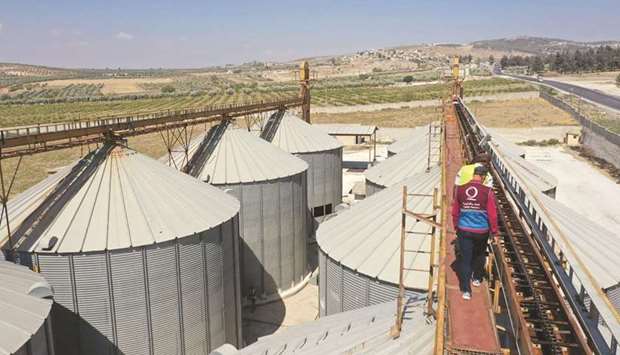Qatar Charity picks up where previous projects left, delivering a resourceful initiative which benefits Syrian farmers, manual workers and families alike.
Qatar Charity is preparing two plantations in Aleppo, Syria, for the second year in a row, for the propagation of wheat in a sustainable manner that will benefit Syrian livelihoods.
The “Wheat Value Chain Support Project” is erected in the city of Mare’, in the countryside of Aleppo, supporting up to 200 Syrian farmers by providing them with the equipment necessary to propagate one hectare of land, each.
The project, which is carried out in partnership with UN OCHA’s Syria Cross-Border Humanitarian Fund, contributes to improving food security and livelihoods in northern Syria where wheat is one of the most important crops and facilitates a self-sustainable system by which Syrian farmers, bakeries and eventual recipients all benefit from.
Qatar’s Assistant Foriegn Minister Lolwah Alkhater tweeted in support of the initiative, stating, “A pilot project for [Qatar Charity] in its third year, represents a complete sustainable cycle that benefits [our] Syrian brothers–from buying seeds to baking and distributing bread.”
مشروع رائد ل @qcharity في عامه ال٣ يمثل دورة كاملة مستدامة يفيد منها الأشقاء السوريون من شراء البذور إلى خبز وتوزيع الخبز 🌾
١) زراعة أرض سورية (٢) إيجاد مصدر دخل للمزارعين (٣) شراء المحاصيل منهم بدل شرائها من أسواق وشركات عالمية (٤) وأخيرا توزيع ما تم شراؤه على المحتاجين منهم🍃 https://t.co/I3sy4Wee0z pic.twitter.com/0X4avDIiWa
— لولوة الخاطر Lolwah Alkhater (@Lolwah_Alkhater) February 11, 2022
Alkhater continued to explain the process of the project, saying that it involves, “cultivating Syrian land, finding a source of income for farmers, buying crops from them instead of buying from international markets and companies, and finally distributing what was purchased to those most in need.”
A video accompanied with the assistant foreign minister’s tweet highlighted the ways in which Qatar Charity have proceeded with the project, including the rehabilitation of a silos facility in Mare’ with capacity of 12,000 tonnes, and the investment in various equipment to assist with the processing and production of wheat.
The project further contributes to the shaping of Syrians livelihoods; both in providing jobs and training cadres in the maintenance of the facilities, and through pooling the production back into a sustainable local system—by buying from the local farmers, supplying the wheat to local bakeries and distributing end products of bread and flour to those most in need within the local community.
Read more: Qatar Charity builds housing complex for thousands of Syrians
Since the onset of violence in Syria, non-regime held areas have witnessed disruptions in the wheat-to-bread making process, and a transformation from being completely sufficient in domestic production to being dependent on imports and aid support from neighbouring countries.
Various projects over the years by both local NGOs and INGOs have attempted to circumvent the situation and gradually return to a domestically-sufficient system, of which Qatar Charity’s endeavour is the latest in such efforts.
In 2021, Assad regime violence lead to the burning of thousands of acres of crops and farmland in the provinces of Hama and Idlib, forcing at least 300,000 people to flee their homes and a dearth in land cultivation and farming capacities.
Follow Doha News on Twitter, Instagram, Facebook and Youtube







